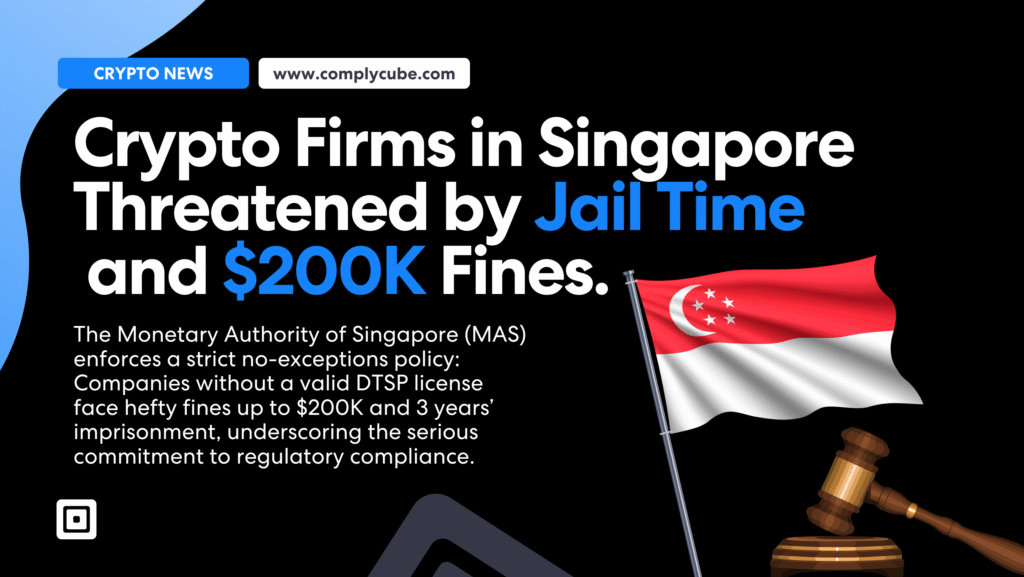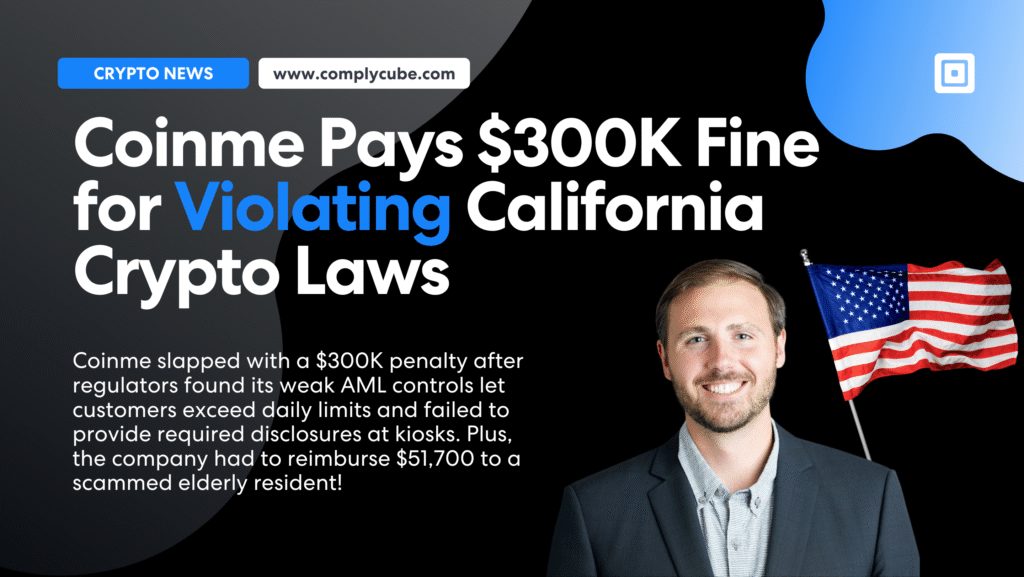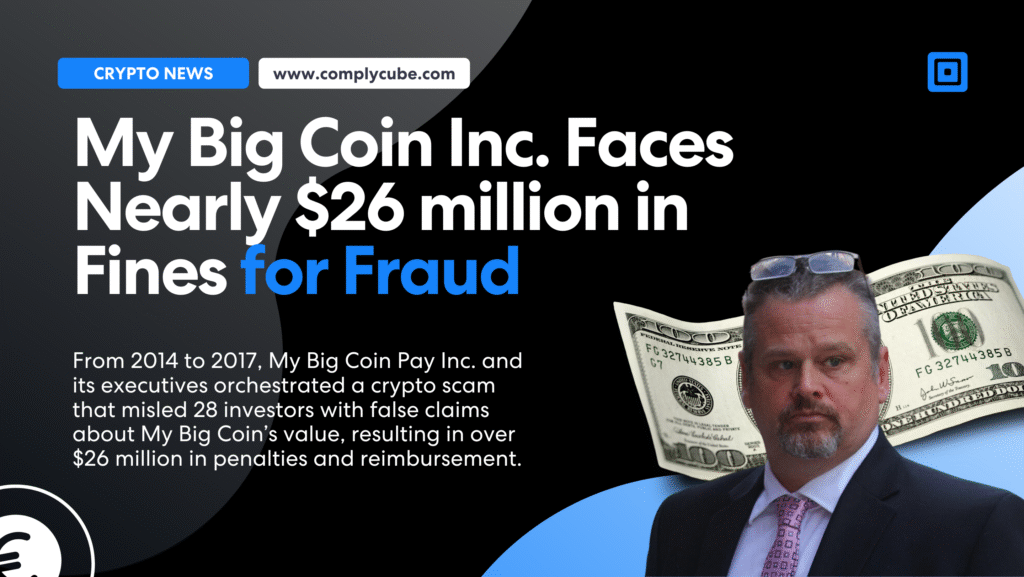👋 Welcome back to CryptoCubed!
June was anything but quiet for the crypto world. From Singapore’s $200K ultimatum for unlicensed international crypto to My Big Coin Pay Inc. facing $26 million worth of fines for fraud, the message is clearer than ever: the era of crypto’s Wild West is ending, or is it really? Buckle up for the June Edition of CryptoCubed. Sit tight as we break down the biggest enforcement actions and what they mean for the future of crypto.

Crypto Firms in Singapore Threatened by Jail Time and $200K Fines
Singapore, known for its robust security, has taken it a step further by enforcing new regulations within the crypto industry. Effective June 30th this year, all companies that provide digital token services to overseas clients must obtain a Digital Token Service Provider (DTSP) license under the new licensing framework introduced by the Monetary Authority of Singapore (MAS).
The DTSP license introduces strict compliance standards, including enhanced Anti-Money Laundering (AML) and Counter-Terrorism Financing (CFT) measures. The license also calls for frequent routine-based risk assessments and operational controls. Any crypto business found without the DTSP license will face extreme charges, including massive fines of up to SGD 250,000 (about USD 200,000) and up to three years in prison.

The MAS has maintained this strict regulation, providing zero grace periods or exceptions for any company caught without a valid DTSP license. This bold move came about as the MAS aimed to close the potential gaps that could be exploited by international crypto firms operating from Singapore without adequate local oversight. Crypto companies in Singapore are now faced with two challenging options: to get DTSP-certified and face increasing compliance costs and resources, or to permanently relocate to jurisdictions with more flexible regulations.
For more on this story, click here.
Coinme Pays $300K Fine for Violating California Crypto Laws
California has imposed its first enforcement action under the new Digital Financial Assets Law on Coinme, a Seattle-based crypto ATM operator. Founded in 2014, Coinme is the largest certified crytocurrency cash exchange in the U.S, enabling users to buy crypto with cash seamlessly.
The $300,000 penalty was imposed after regulators found that Coinme had weak AML controls, facilitating customers in making daily transactions over the current limit of $1K per user. Additionally, the firm failed to include the required disclosures on receipts at its kiosk, located throughout California’s grocery and convenience stores. Part of the settlement involved the company paying $51,700 in reimbursement to an elderly resident who was scammed, highlighting the law’s emphasis on consumer protection.

In 2024, the US Federal Bureau of Investigation (FBI) filed nearly 11,000 complaints and over $246 million in losses from such scams. Officials in California aim to send a strong warning to other digital asset operators that strict compliance is here to stay. The law gained traction in 2023 in response to the rise in crypto ATM scams, where fraudsters trick victims into buying crypto at kiosks and directing those funds to criminals.
For more on this story, click here.
$65K in Fines and Suspension for Crypto Broker Involved in Secret Digital Assets
Canadian broker Christopher Meehan, was struck with $65,000 worth of fines and suspended for four months after managing over $1.2 million in crypto assets for clients without regulatory oversight. This case emphasizes the increasing scrutiny over crypto trading, which is now being closely monitored for both firms and professionals in the industry.
The crackdown came about when the British Columbia Securities Commission (BCSC) flagged an unregistered company that Meehan had set up for his off-book operations. From 2019 to 2022, Meehan was caught accepting and depositing huge sums of crypto assets into his wallet and trading them on behalf of eight clients and 22 investors.

Meehan committed over 6,000 trades across over 75 types of cryptocurrencies. The penalty showcases the growing compliance requirements worldwide, as Canadian authorities now classify crypto trading on behalf of others as securities, mandating full registration license and compliance. Officials now encourage investors to fully verify broker license and steer clear of any form of off-book arrangements.
For more on this story, click here.
My Big Coin Inc. Faces Nearly $26 million in Fines for Fraud
From 2014 to 2017, My Big Coin Pay Inc. (MBC) and its executives were involved in an ongoing fraudulent virtual currency scheme. MBC was established so that anyone with an email account can send or receive My Big Coins crypto assets. The Massachusetts federal court imposed over $26 million in penalties and restitution, including $19.32 million in civil penalties and $6.44 million in reimbursement to victims.
Those involved included Mark Gillespie, John Roche, and Randall Crater, who misled 28 investors by making inaccurate claims about My Big Coin’s value and trade status, coaxing them to invest under deception. The Commodity Futures Trading Commission (CFTC), in charge of protecting consumers from fraud has also permanently banned them from participating in any CFTC-regulated markets.

In 2024, the FBI Internet Crime Complaint Center’s 2024 Internet Crime Report had filed over $5.8 billion in losses from cryptocurrency investment fraud. The US has ramped up its efforts to address the challenges induced by cryptocurrency dealings, warning other digital assets promoters of the severe legal and monetary implications of participating in money laundering, fraud, and deception.
For more on this story, click here.
Former FTX EU Subsidiary Faces €200,000 in Penalties Over Compliance Failures
The Cyprus Securities and Exchange Commission (CySEC) has fined the former FTX EU subsidiary, now renamed Trek Labs Europe, €200,000 for compliance failures. The failures occurred between March and November 2022 and were uncovered during a compliance assessment. Some of the failures included weak KYC procedures and not providing transparent and clear information to customers.
Despite changes in ownership and branding, the settlement addresses the period when FTX EU operated under its previous management. CySEC’s action underlines the ongoing regulatory scrutiny faced by crypto firms in Europe, with leading companies such as Binance and Coinbase facing similar charges. The enforcement of larger penalties also showcases the country’s larger push to safeguard the security and confidence of its financial sector to attract more investors and financial companies.
For more on this story, click here.

Time for The Poem You Have Been Waiting for
So you’ve made it to the end of our newsletter. It’s time to enjoy a little satire, worthy reader, you’ve earned it.
🔥THE CRYPTO CUBED POEM: JUNE🔥
Is Crypto’s Wild West fading fast?
As regulators’ grip is built to last,
From Singapore’s fines to U.S. law,
Enforcers are on the act without a flaw.
Big names caught in compliance nets,
The cost of rule-breaking, mounting debts.
As June unfolds, the message is clear:
A safer crypto world is drawing near.
Stay tuned for our July newsletter, and have a great month!




